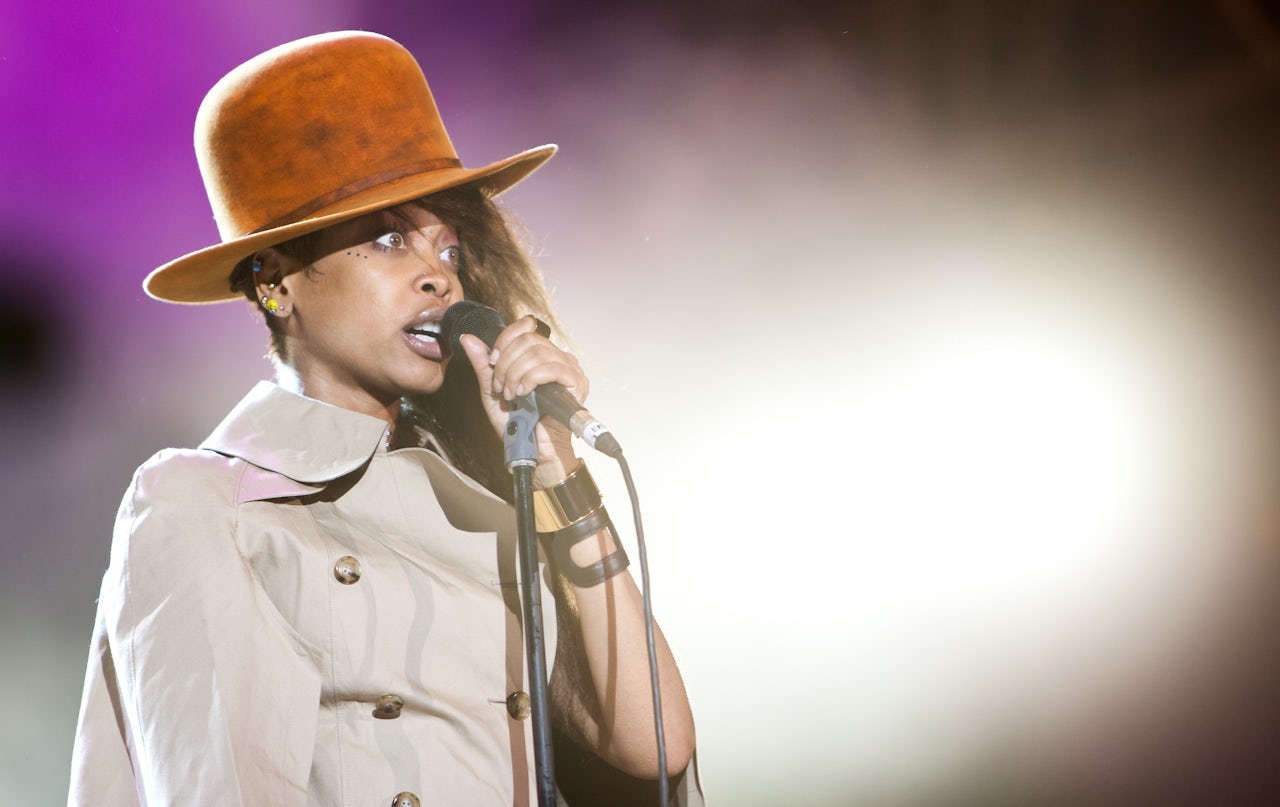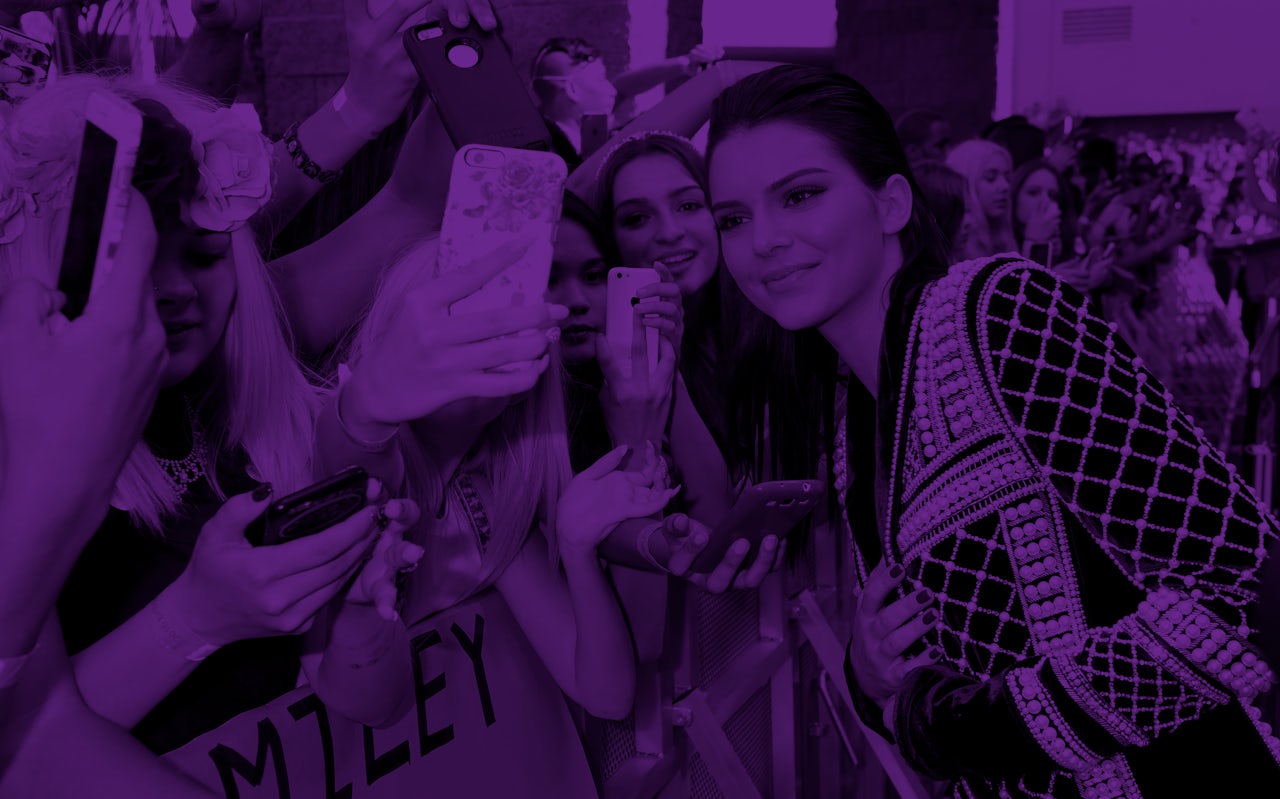In her 2010 video for “Window Seat,” Erykah Badu strips naked on a city street, her hair in a wig cap and the word “Evolving” written across her upper back. By the video’s end, she is shot dead by an unknown assailant, ostensibly for the crime of being proudly and openly black. It was a natural chapter for an artist who has built a career on neo-soul songs about spirituality, love, astrology, and an image of unapologetic black womanhood. And in her non-musical ventures — including becoming a doula, an advocate of veganism, and an avant garde fashion icon — Badu has established a persona marked by otherworldliness, wisdom, and by extension, wokeness.
But many Badu fans were left buzzing following a downright wild interview with Vulture’s David Marchese, in which the singer characteristically said whatever was on her mind. Badu and Marchese covered standard celebrity interview topics like the state of her industry, what makes her nervous, and social media presence… all of which was par for the course, until she made sympathetic comments about Bill Cosby, XXXtentacion, and even Adolf Hitler. “I saw something good in Hitler,” she said to Marchese’s amazement. “Hitler was a wonderful painter.” (Elsewhere: “I love Bill Cosby, and I love what he’s done for the world.”) The singer chalked up her empathy for evil men to her astrological sign — she’s a Pisces, as is Marchese — her belief in “humanism,” and wanting to separate herself from the “hive mentality.” “I’m not an anti-Semitic person. I don’t even know what anti-Semitic was before I was called it. I’m a humanist. I see good in everybody,” she said, just before sharing her sympathy for Hitler.
The interview instantly went viral, receiving coverage across the internet, and sparking a lot of conversation online between fans who condemned her remarks, and those excusing them as something to be expected from such a singular and eccentric figure. Though her answers may have seemed shocking, they’re not the first time she’s courted controversy by deviating from the political norm. As Marchese brought up in his interview, Badu has in the past supported Louis Farrakahn, who is a noted anti-Semite. In 2016, she voiced support for a school that ordered its female students to have longer skirts so as to not distract their male teachers. In 2015, while introducing R. Kelly at the Soul Train Awards, Badu called the alleged sexual abuser her brother and claimed he “has done more for black people than anyone.”
For many, it’s hard to think that someone who is anti-Trump and talented and spiritual can make irresponsible statements about Hitler and sexual predators.
Despite her frequent musings on spirituality, astrology, doulaing, and the like, Badu is rarely so consistent as to be exemplified as a figure of extra-human enlightenment. Nevertheless, she has retained this mythic status in pop culture that extends beyond her music. There is a gendered racial element at play: The image of Badu as the magical auntie ascribes a higher consciousness to her that threatens to curb critical thinking about the actual things she says. Badu is an amazing artist and usually a delightful public figure — her fans’ inability to reconcile that with evidence that she sympathizes with very bad men, and in the case of R. Kelly even enables them, has been key in her rise to social media holiness. As she expressed in the interview, Badu is unpressed about examining those views, dismissing concern from fans as non-intellectual “groupthink.” For many, it’s hard to think that someone who is anti-Trump and talented and spiritual can make irresponsible statements about Hitler and sexual predators.
The Vulture interview brings up obvious questions of whether Badu is anti-Semitic, or if she has taken the time to fully understand how anti-Semitism manifests itself in our everyday. That’s between her and God, but it was easier to wonder this: Who decided that Badu was “woke,” anyways? (Aside from the fact that she’s literally credited with popularizing the phrase “woke” in her 2008 song “Master Teacher.”)The word “woke” itself is a minefield of context and interpretation, but its general use — to describe someone who is informed about sociopolitical history and current affairs with an emphasis on racial injustice, class injustice, and other societal power imbalances — is often the root of outrage over popular figures in entertainment. If Richard Spencer were to tell an interviewer he thinks Hitler was a lovely painter, few people would be surprised. It’s a statement we expect from a white, male, alt-right leader, but not so much from an anti-Trump black woman who is one of the world’s most beloved neo-soul artists. The mold Badu is placed in comes with assumptions of liberalism, something Badu has made clear she neither deserves nor wants.
As always, when a celebrity is revealed to be “problematic”, there is a supremely personal frustration by being disappointed by someone you admire. Writer Ijeoma Oluo got to the heart of why in a 2015 essay titled “Admit It: Your Fave Is Problematic”: “Our reluctance to have an honest and open conversation about the flaws of celebrities we love stems from a simple fact: we see ourselves in them. If your favorite smart, talented, successful celebrity can be classist, sexist or racist then what does that say about you? Well, it says that you can be classist, sexist, racist, homophobic, or transphobic.” In keeping with this idea, responding to most problematic fave isn’t just about “cancellation,” or excusing their statements so you can support them without qualms.
This is especially true with regards to Badu, considering that, unlike the evil men she defended she isn’t guilty of committing any assaults, murder, or other atrocities. Nor, as in the case of Richard Spencer, has she advocated for an ethno-state of any kind nor led any sort of racial supremacist movement. She does, however, hold some socially conservative views, is ignorant about anti-Semitism with no apparent plans to change, and chooses to speak on evil men without feeling the need to condemn their actions. So what is it we want from her? An apology, a condemnation, an assurance that she will try to “do better” depending on which audience she is speaking to? Don’t hold your breath. Rather, the question to ask now is what part of our perception of Badu has changed, and why we saw her that way to begin with.
Indeed, the best thing to come out of Marchese’s interview with Badu is the model of their dialogue itself. Instead of accepting her love of XXXtentacion’s music and her generous words about the fascist leader responsible for the genocide of 6 million Jews as parts of her “wacky” persona, Marchese pushed back in an attempt to hold her accountable for her words — to get to know her as one would any other relative stranger, and not excuse her because he may have been a fan of her music. They had a free-flowing back and forth; they attempted to leave it on a good note. More people should look past persona and gravitas, and do the same.

